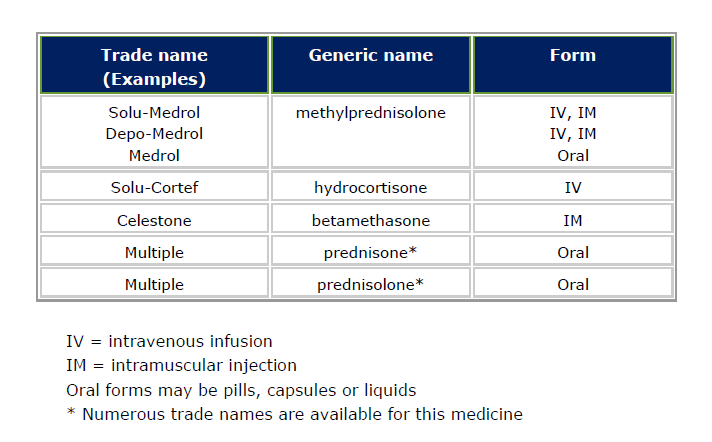Don’t confuse the oral corticosteroids (OCS) you take for lung disease with the anabolic steroids that some athletes use to increase muscle mass. Corticosteroids are the strongest medicines you can take to treat severe obstructive lung disease and many other conditions that cause inflammation.
Download Oral Corticosteroids (OCS) as a PDF.
OCS are similar to hormones produced primarily by the adrenal glands, which are located directly above your kidneys. These hormones play a key role in metabolism and other complex bodily functions.
Researchers don’t fully understand how steroids help asthma, emphysema, COPD, and other chronic lung conditions. But, they are studying them to find out.
Steroids have a wide-ranging effect on many parts of your body. You should use them with caution, and your doctor should monitor you closely. Although these drugs can be life-saving, they may cause severe side effects. This is especially true if you take them for a long time, or take high doses.
OCS can be taken:
- As a pill or capsule
- As an injection
Inhaled corticosteroids (ICS) and OCS are a lot alike, but you breathe ICS into your lungs. And, they have many fewer side effects than OCS.
Systemic steroids (Oral corticosteroids or injections)
“Systemically” means that a drug enters your bloodstream and affects your entire body. Doctors prescribe systemic corticosteroids for people with severe Alpha-1 lung disease, or to Alphas having severe flare-ups. You can take systemic corticosteroids as an OCS pill or liquid. In rare emergency situations, you may get corticosteroids as a shot into a muscle or vein.
Steroids reduce inflammation dramatically. That’s great when the inflammation is a side effect of a disease like asthma or arthritis. But it’s a problem when the inflammation is part of your body’s efforts to fight infection.
Some people who take OCS develop life-threatening bacterial infections without knowing it. Because of the steroids, they don’t have any of the usual signs of infection like fever, redness, swelling, and pain.
For this reason, long-term OCS use is generally avoided except for extreme cases of disease.
Weaning off steroids
You should also take care when you stop taking OCS. That’s because when you take these medicines for more than 21 days, your body stops producing its own steroids.
Your body’s steroid levels can fall to dangerous levels if you stop taking your OCS suddenly. To avoid putting your health at risk, your doctor will use tapered doses to wean you off OCS. This gives your body the time it needs to resume normal steroid production.
Safety tips for oral corticosteroids
If you have a serious injury or need surgery, you may need higher doses of steroids. Be sure to let your doctor know if you’ve been weaned from OCS within the past year.
Wearing a medical alert necklace or bracelet is a good idea, too. It should say “chronic OCS use.” Wear this if you take chronic OCS or if you’ve been weaned off them within the past year.
Routine steroid use and side effects
Using steroid pills or frequent steroid bursts can cause a number of side effects. Steroid side effects usually occur after long-term use or high doses of steroid pills. High doses of inhaled steroids can also cause some of these same side effects.
Chronic and intermittent use of OCS medications can increase your risk of osteoporosis (soft bones) and fractures. Your doctor can help prevent this by monitoring your bone density.
Download a table of common side effects of oral corticosteroids.
Oral corticosteroids (OCS)

For more in-depth information on this topic, please visit the Big Fat Reference Guide (BFRG). If you are enrolled in AlphaNet’s Subscriber Portal, you can access the BFRG here.
Download Oral Corticosteroids (OCS) as a PDF.

